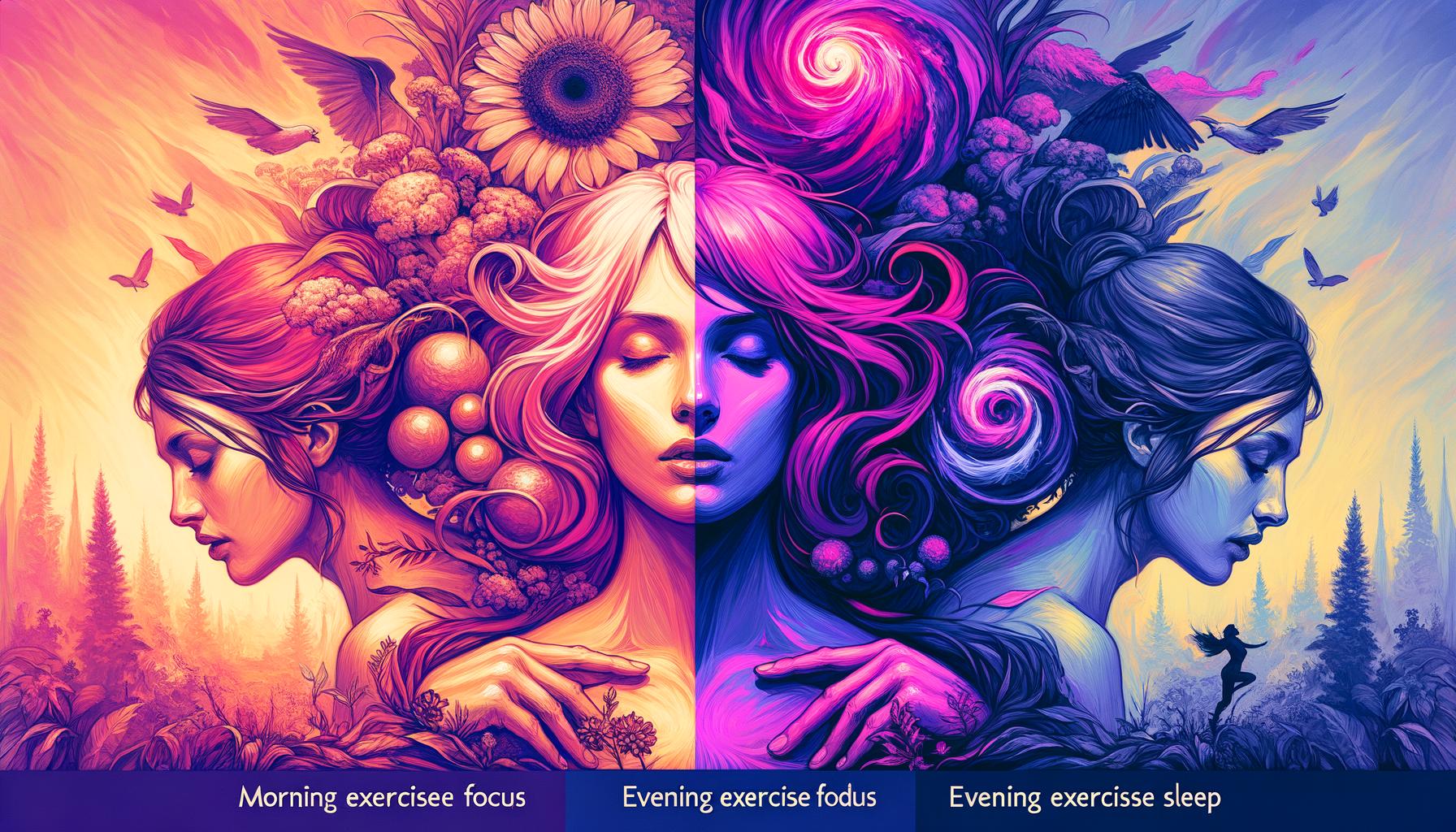· fitness · 15 min read
Boosting Wellness with Morning Light: Sleep & Mood Benefits
Explore how morning light can enhance your sleep patterns, mood, and overall health by synchronizing your circadian rhythm and boosting natural hormone release.

In This Post
The Fact Why Should I Care How To Put In Action Start Tomorrow Guide How does it effect my ability to focus How does it impact my daily life How does it help me make friends How does it help me manage stress How does it effect my mood Summary: Remember Refresher Checklist The Full Research Article CitationsPrint Out The Tomorrow Checklist!
Sign up for our newsletter and receive a copy today, so that, you can start tomorrow! Or the next day, or the day after that. I forget everything and starting things is hard at least for me so these checklists are godsend.
Print Out The Remember Refresher Checklist!
Sign up for our newsletter and download your own copy of the Remember Refresher Checklist, so that, you can easily put it on your fridge and help you stay on target towards your WHY. Every little bit helps.
Introduction
Understanding Circadian Rhythm
Our bodies run on a 24-hour internal clock known as the circadian rhythm. This natural timer helps regulate when we feel awake and when we feel sleepy. It’s influenced by various factors, but one of the most significant is light. Light tells our bodies when to release certain hormones, such as cortisol, which helps us wake up, and melatonin, which signals it’s time to sleep. Because of modern lifestyles, our circadian rhythms can often become out of sync, affecting our sleep patterns and overall health.
- Check how well you know your circadian rhythm:
- Do you feel energetic and awake with the sunrise?
- Do you find it difficult to wake up in the morning?
- Do you feel sleepy when it’s dark outside?
The Role of Natural Light in Daily Life
Natural light is much more than just a way to brighten our homes and offices; it’s essential for maintaining a healthy circadian rhythm. Exposure to sunlight, especially in the morning, can effectively reset our internal clocks each day, making it easier to wake up and feel energized. Sunlight plays a crucial role in regulating our metabolism effects, hormone release, and sleep patterns, profoundly impacting our physical and psychological health.
- Simple ways to incorporate more natural light into your day:
- Wake up and expose yourself to sunlight by opening your curtains first thing in the morning.
- Try to spend your morning coffee time outside or by a sunny window.
- Arrange your workspace to get as much natural light as possible.
In essence, understanding and leveraging the power of the circadian rhythm and natural light can significantly enhance our well-being. By aligning our daily routines with these biological and environmental cues, we can improve sleep quality, boost our mood, and promote a healthier lifestyle. Stay tuned as we dive deeper into the science behind the benefits of morning light on wellness in the following sections.
Science Behind Morning Light and Wellness
Light’s Effect on the Circadian System
The circadian system, our body’s internal clock, is deeply influenced by the natural light cycle of day and night. When morning light interacts with our eyes, it sends signals to the brain, specifically the suprachiasmatic nucleus in the hypothalamus, which is the control center for our circadian rhythm. This exposure to natural light in the morning helps reset our circadian clock daily, having a profound effect on sleep patterns, hormone release, and overall metabolism effects.
But how exactly does this process work? The light detected by our eyes influences the production of various hormones that regulate sleep, alertness, and mood. Morning sunlight is particularly crucial because it contains high levels of blue light, which is most effective at suppressing melatonin, the hormone that makes us feel sleepy. By getting sunlight early in the day, we tell our body it’s time to wake up and start the day, thereby adjusting our sleep-wake cycle for better sleep quality at night.
Morning Workouts in Sunshine: A Biochemical Overview
Engaging in morning exercise under the sunlight adds another layer of benefits, primarily through its biochemical impact on our bodies. Here’s a quick checklist to summarize the biochemical sequence activated by morning sunlight during exercise:
- Exposure to sunlight increases Vitamin D production, crucial for bone health and immune system function.
- The physical activity itself enhances serotonin levels, which can boost mood and help prevent feelings of depression and anxiety.
- Sunlight influences the levels of endorphins released during exercise, heightening the sense of well-being and pain relief.
- Morning light helps regulate the body’s internal clock, leading to improved metabolism and energy levels throughout the day.
These processes highlight the interconnectedness of sunlight exposure, morning exercise, and our biological functions. Engaging in outdoor workouts as part of a routine not only taps into the natural light benefits but also promotes healthy hormone release, including melatonin regulation and increased serotonin levels, which play vital roles in our sleep quality and psychological health.
In summary, the science behind morning light and wellness underscores the importance of aligning our daily activities with the natural environment. By simply adjusting when and how we interact with morning sunlight — such as incorporating a routine of morning exercise outdoors — we can significantly impact our circadian rhythm, sleep quality, mood, and overall health.
Key Benefits of Exposure to Morning Sunlight
Exposure to the first light of the day has profound effects on our well-being. From the way we sleep to how we feel throughout the day, morning sunlight can be a game-changer in our daily lives. Let’s delve into how embracing the early rays can enhance sleep quality and improve mental health.
Enhanced Sleep Quality
One of the most significant benefits of morning sunlight exposure is the positive impact it has on sleep patterns. This connection largely hinges on the production of melatonin, a hormone pivotal for regulating sleep-wake cycles.
The Connection Between Light and Melatonin Production
Our circadian rhythm, or internal clock, is influenced by the natural light we’re exposed to. Morning light stimulates sensors in our eyes, which then signal to our brain to halt melatonin production, the hormone that makes us sleepy. As evening approaches and sunlight diminishes, melatonin production ramps up, preparing our body for rest. By aligning our exposure to natural light with the sun’s cycle, we can maintain a healthy circadian rhythm, leading to better night’s sleep.
Case Studies and Research Findings
Research has shown that individuals who make a point of exposing themselves to morning light experience shorter sleep onset latency, meaning they fall asleep faster and have longer, more restful nights. Studies highlight that even moderate exposure to natural light within the first two hours after waking can yield noticeable sleep quality improvements.
- Make it a habit to seek sunlight within the first hour of waking up
- Aim for at least 20-30 minutes of morning sunlight exposure
- Keep bedroom curtains open to let the natural light in upon waking
Improved Mood and Mental Health
Another compelling advantage of morning sunlight is its ability to uplift our mood and strengthen our mental health. The link between sunlight and serotonin levels plays a crucial part in this benefit.
Scientific Explanation of Light’s Effect on Serotonin Levels
Serotonin, often referred to as the “feel-good” hormone, is crucial for mood regulation. Like melatonin, serotonin levels are also affected by our exposure to natural light. Morning sunlight can increase serotonin production, leading to enhanced mood, higher energy levels, and a more positive outlook overall. This biochemical response to sunlight can be especially beneficial for individuals dealing with depression or seasonal affective disorder (SAD).
Personal Testimonies and Psychological Analyses
Anecdotal evidence and psychological studies support the mood-enhancing effects of morning sunlight exposure. Individuals regularly soaking up the morning sun report feeling more energetic, happier, and more peaceful throughout the day. Furthermore, therapeutic practices that incorporate morning light exposure have shown promising results in improving symptoms of depression and anxiety, reaffirming the potent influence of natural light on our psychological health.
- Strive to incorporate outdoor activities into your morning routine
- Use breakfast or coffee time as an opportunity to bask in the sunlight
- Open windows and create light-filled spaces at home and work
Morning sunlight does more than just brighten our day; it plays a critical role in setting our internal clocks straight, improving our sleep, and significantly enhancing our mood and mental health. By making small, consistent changes to our daily routines to include more exposure to morning light, we can harness these natural benefits for our overall well-being.
Practical Tips for Incorporating Morning Light into Workouts
Morning light not only kick-starts your day but also boosts your wellness significantly through its positive impacts on circadian rhythm, sleep patterns, mood and mental health enhancement, and metabolism effects. Implementing morning light into your workouts can bring these benefits full circle, harmonizing your body’s natural rhythms while enhancing overall health. Here’s your guide on how to do it effectively.
Choosing the Right Time and Duration for Sunlight Exposure
To maximize the benefits of sunlight exposure during your workouts, timing and duration are key. The ideal time for soaking in the morning sun is shortly after sunrise, typically between 6 AM to 9 AM. This time window offers the softest, most beneficial light for syncing your circadian rhythm and boosting serotonin levels.
For duration, start with as little as 20 to 30 minutes of sunlight exposure. This is ample time to trigger hormone release associated with wakefulness and mood regulation, without overexposing your skin to UV rays. You can adjust the duration as per your skin type and weather conditions, keeping in mind the primary goal is to enhance sleep quality and psychological health through natural light benefits.
Outdoor Exercise Ideas to Maximize Morning Light Benefits
Incorporating morning light into your workouts doesn’t mean limiting your activities. Here are several outdoor workout ideas designed to synchronize your body’s internal clock, boost metabolism effects, and enhance mental health:
- Morning jog or brisk walking in a nearby park.
- Yoga or Tai Chi sessions in your backyard or any open space receiving ample sunlight.
- Outdoor HIIT workouts or cycling around your neighborhood.
- Group sports activities like soccer or basketball in outdoor courts.
These activities not only expose you to beneficial morning sunlight but also leverage the metabolism effects of engaging in physical exercises, further enhancing sleep quality and mood.
Safety Measures and Skin Protection
While reaping the benefits of morning light, it’s paramount to safeguard your skin and overall health:
- Apply broad-spectrum sunscreen with at least SPF 30 to protect against UVA and UVB rays, even on cloudy days.
- Wear protective clothing, such as hats and sunglasses, to shield your skin and eyes.
- Stay hydrated by drinking plenty of water before, during, and after your workouts.
Following these protective measures ensures the maximization of the natural light benefits while minimizing the risk of skin damage from UV exposure.
Alternative Solutions for Days Without Sunshine
On days when the sunshine is scarce or you’re unable to head outdoors, here are some alternative solutions to mimic the effects of morning light:
- Use light therapy lamps, especially designed to simulate sunlight. These can be particularly beneficial for night shift workers struggling to maintain a regular circadian rhythm.
- Choose brightly lit indoor spaces for your workouts, preferably close to large windows.
- Engage in regular indoor exercises to maintain your physical health, which indirectly supports sleep patterns and mood stabilization.
Checklist for Incorporating Morning Light into Your Workouts
- Check weather forecasts to plan your outdoor activities.
- Aim to start your workouts shortly after sunrise for optimal light.
- Limit direct sunlight exposure to 20-30 minutes, especially if you have sensitive skin.
- Apply sunscreen and wear protective clothing.
- Stay hydrated before, during, and after workouts.
- Have a backup plan for indoor workouts on days without sunlight.
By embracing these practical tips, you can effectively incorporate morning light into your workouts, bolstering your circadian rhythm, enhancing sleep quality, and uplifting your mood through the natural benefits of sunlight exposure.
FAQs on Boosting Wellness with Morning Light
Frequent questions have arisen regarding the integration of morning sunlight into daily rhythms to enhance both sleep and mood. Here’s a closer look at some of these inquiries, shedding light on the optimal ways to utilize morning sunlight for wellness benefits.
How Much Morning Sunlight is Needed to Impact Sleep?
The duration of morning sunlight exposure necessary to positively influence sleep patterns varies among individuals. However, research suggests that even a brief exposure, ranging from 20 to 30 minutes, can be significantly beneficial. This exposure assists in the regulation of melatonin, a hormone pivotal for healthy sleep cycles, thereby improving overall sleep quality.
- Aim for at least 20-30 minutes of morning sunlight.
- Ensure exposure is within the first two hours after waking up.
- Consistency is key for long-term sleep pattern improvement.
Can Morning Light Exposure Benefit Night Shift Workers?
Absolutely, night shift workers can benefit from regulated exposure to morning light. Despite their unconventional work hours disrupting natural circadian rhythms, exposure to morning sunlight can help reset their internal clocks. It aids in adjusting their sleep cycles and improving mood, proving beneficial for those whose jobs require them to work through the night.
- Try to get sunlight exposure after the end of a night shift.
- Use sunlight-mimicking artificial light if direct sunlight is not an option.
- Implement regular patterns of light exposure to support a healthier circadian rhythm.
Are There Specific Weather Conditions That Enhance Morning Light’s Effects?
While clear, sunny mornings are ideal for maximum light exposure, overcast conditions can also provide significant benefits. The key factor is the brightness of the outdoor environment compared to indoor settings. Even on cloudy days, natural light outdoors is generally much brighter than artificial light indoors, supporting serotonin production and circadian rhythm balancing.
- Prefer sunny days for outdoor workouts to maximize benefits.
- Utilize overcast days as they still offer more light than indoor environments.
- Remember, some sunlight exposure, regardless of weather, is better than none.
The interaction between our bodies and morning sunlight underscores the profound impact of natural elements on wellness. By making a concerted effort to spend time in morning light, individuals can nurture their circadian rhythms, enhance sleep quality, and boost overall psychological health.
Conclusion: Embracing Morning Light for Enhanced Wellness
After exploring the significant impact of morning light on our sleep patterns, mood, and overall well-being, it’s clear that incorporating sunlight into our daily routine offers numerous health benefits. Morning sunlight acts as a powerful tool in regulating our circadian rhythm, which in turn, improves the release of hormones like melatonin and serotonin. These biochemical effects not only bolster our sleep quality but also uplift our mental health.
Recap of Benefits and Encouragement to Try
To summarize, here are some compelling reasons why you should consider making morning light a part of your routine:
Regulates the Circadian Rhythm: Exposure to natural light first thing in the morning helps synchronize our body’s internal clock, leading to more consistent sleep patterns.
Boosts Melatonin Production: By aligning our circadian rhythm, morning sunlight exposure indirectly aids in the efficient release of melatonin, the hormone responsible for sleep, thereby enhancing sleep quality.
Elevates Serotonin Levels: Sunlight influences the production of serotonin, a key hormone that stabilizes our mood, feelings of well-being, and happiness.
Improves Physical Health: Morning exercises in natural light not only contribute to better metabolic effects but also combine the benefits of physical activity with the biochemical impact of sunlight.
Enhances Mental Well-being: The psychological health benefits associated with morning light—stemming from improved sleep and increased serotonin levels—cannot be overstated.
Encouragement to Try Incorporating Morning Light
If you’ve yet to experience the benefits of morning sunlight exposure, now is the perfect time to start. Here is a simple checklist to help you begin:
[ ] Start Small: Begin with just a few minutes of sunlight each morning and gradually increase the duration.
[ ] Incorporate Outdoor Activity: Choose an outdoor workout or simply a walk in the sun to get your daily dose of vitamin D and serenity.
[ ] Regular Timing: Try to expose yourself to sunlight at the same time every day to help establish a consistent sleep-wake cycle.
[ ] Utilize Alternative Methods on Cloudy Days: On days when the sun refuses to shine, consider using a light therapy box to mimic natural sunlight.
[ ] Safety First: Remember to apply sunscreen and wear protective clothing as needed to safeguard your skin during outdoor activities.
Trying something new, especially when it comes to modifying daily routines, can be challenging. However, the rewards of better sleep quality, improved mood, and an overall sense of well-being are well worth the effort. We encourage you to embrace the morning light, not just as a source of vitamin D, but as a natural enhancer of life quality. Whether it’s through morning exercise or simply savoring a few peaceful moments in the sunshine, the path to improved wellness is luminous and awaits your first step.
Relevant External Links
In our journey to unlock the full potential of morning light for enhancing sleep quality, mood, and overall wellness, strategic knowledge-sharing becomes crucial. To further bolster your understanding and provide more comprehensive insights, here are three invaluable resources that offer rich, research-backed information. These links serve not only as extensions to our discussion but also as gateways to broader vistas of knowledge in the realms of sleep, sunlight exposure, and morning exercise benefits.
National Sleep Foundation: How Light Affects Sleep - “Understanding the Influence of Light on Sleep”
This resource delves deeply into how various types of light impact our circadian rhythms and overall sleep patterns. It underscores the vital role light plays in regulating our biological clock, influencing hormone release, and optimizing our sleep-wake cycles. For anyone looking to refine their understanding of sleep mechanics or seeking practical advice to improve sleep quality through natural light benefits, this destination offers comprehensive insights.
MindBodyGreen: The Importance of Morning Sunlight - “Leveraging Morning Sun for Health”
MindBodyGreen brings a holistic approach to leveraging morning sunlight for bolstering health. This source explores the myriad ways in which sunlight exposure, particularly in the morning, can fortify mental health enhancement, serotonin levels, and metabolism effects. Its emphasis on the interconnection between sunlight and psychological health, backed by scientific scrutiny and personal testimonies, makes it a must-visit for those focused on holistic wellness.
HealthLine: Benefits of Morning Exercise - “Maximizing Morning Workouts”
For fitness enthusiasts or anyone pondering the integration of outdoor workouts into their daily regime, this link is a treasure trove of information. It explores the biochemical impact of sunlight experienced during morning exercise sessions, offering a unique perspective on how these activities not only boost physical health but also positively affect sleep quality improvement and mood. From practical tips to protective measures for outdoor exercise, HealthLine provides actionable insights.
Getting the Most Out of External Resources
To ensure that your exploration of these resources is as fruitful as possible, here’s a quick checklist to guide your journey:
- Focus on sections discussing the circadian rhythm and its adjustment through sunlight exposure.
- Look for case studies or research findings that link morning sunlight with melatonin regulation and serotonin levels.
- Pay special attention to practical tips for integrating morning light into your routine for maximum health benefits.
- Consider any protective measures for outdoor exercise highlighted, especially related to skin protection.
- Explore any mentioned alternatives for days without sunshine or for individuals, like night shift workers, facing unique challenges.
These articles are carefully curated to complement the knowledge shared in our discussions, bringing you a step closer to mastering your wellness journey through the power of morning light. Engage with these resources with an open mind, and allow the science-backed insights to further enhance your daily routines for the betterment of your sleep patterns and psychological health.





